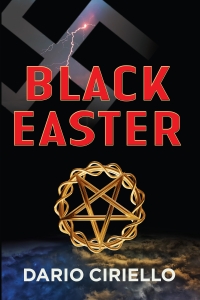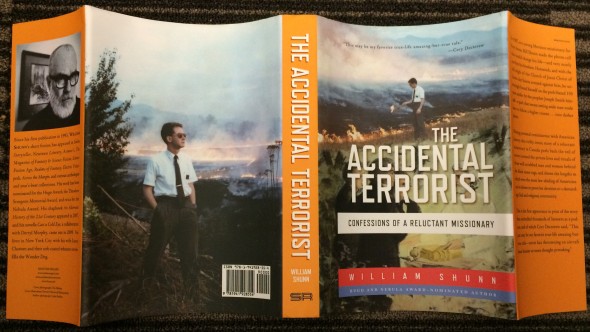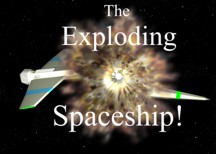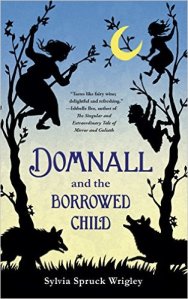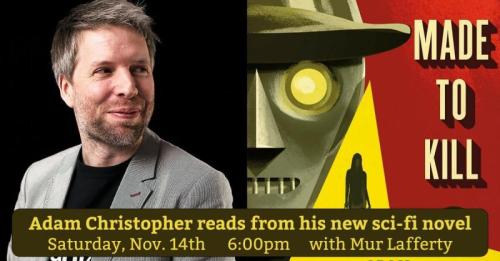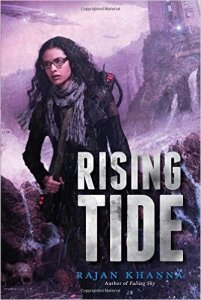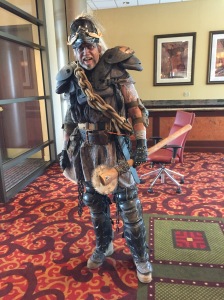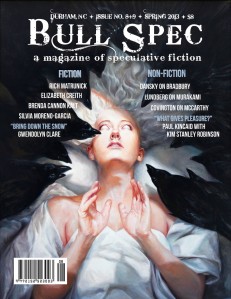Coming to Town: Okla Elliott and Raul Clement for The Doors You Mark Are Your Own, at Atomic Empire and So & So Books
Posted: 21 December, 2015 Filed under: Coming to Town | Tags: atomic empire, okla elliott, raul clement Leave a commentWhen UNC-Greensboro graduates Okla Elliott and Raul Clement came back through North Carolina this spring in support of the publication of their debut novel The Doors You Mark Are Your Own (Dark House Press, April 2015) I was caught completely unawares — I have got to keep a better eye on The Regulator’s newsletter! Not so this time, as I’ve got both their reading tomorrow (Tuesday, December 22, at Durham’s Atomic Empire) and early next year (Wednesday, January 6, at Raleigh’s So & So Books) circled on my calendar.
The novel is in turns a postmodern bit of surrealism, an epic literary dystopia, and a Russian science fiction pulp. There’s the book’s fictional “author” (Aleksander Tuvim) and the fake “biographies” of our two “translators”, Elliott and Clement. There are marked-out passages, inset journal entries, footnotes, maps, a Dostoevskian cast of characters, revolutionaries, plagues, sibling rivalries, and subplots and tangents galore. And, at 724 pages, it’s only the first book in a planned trilogy set in the fictional future world of Joshua City.
Here, Elliott and Clement answer a few questions about the trilogy’s origins, their literary influences, the balancing act of side-plot overload, the book’s road to publication and its book design, and when we might expect to see book two. Enjoy! And see you at Atomic Empire tomorrow, where you can also pick up a wide swath of last-minute gifts. And there’s beer on tap. Just saying.
Q: How far back do the origins of The Doors You Mark Are Your Own and “Aleksandr Tuvim” lie? All the way back to your UNC-G days?
We met in 2004, while working at New York Pizza in Greensboro. Okla was a graduate student and Raul an undergrad. The idea went through many iterations. It started with a simple pitch, “Fyodor Dostoevsky’s The Idiot as set in Hollywood,” and then took on more and more elements of science fiction and postmodernism. Originally we envisioned it as something we called “The Platypusical,” which was an odd mix of stage play, musical, and film. Then it became a screenplay. We eventually realized the idea was too big to be contained in that form, so we made it into a novel.
Q: You were both just here this spring on your tour to promote the release of the book; how did this return trip come about, and why (other than the list of good beers on tap!) Atomic Empire for this reading? (I know Raul’s a long time local turned ex-pat, and I’ve held a couple of readings there in the past, but I hardly ever see readings there! It’s a fantastic space.) Read the rest of this entry »
The Hardest Part: Dario Ciriello on Black Easter
Posted: 9 December, 2015 Filed under: The Hardest Part | Tags: dario ciriello Leave a commentI’ve got a fairly decent-sized section of my “favorites” bookshelf dedicated to Dario Ciriello, who since 2009 has edited and published Panverse Publishing. His fantastic 2009 anthology Panverse One was a direct inspiration to starting Bull Spec, and after three outstanding volumes in that all-original-novella series (and another anthology, Eight Against Reality) and his best-selling memoir of a year living in Greece (Aegean Dream) he edited and published novels by Bonnie Randall, Doug Sharp, and T.L. Morganfield, as well as his own international thriller Sutherland’s Rules, a kind of mad-cap drug smuggling misadventure ranging from California to London to Afghanistan and points between, and! his collection Free Verse and Other Stories. He’s one of my favorite people in the world, and I’m pleased as punch to be able to tell you a little about his new supernatural thriller Black Easter, before he tells you a bit about the hard parts of writing it.
Hugo, Nebula, and World Fantasy Award winner Ken Liu calls Black Easter “a perfectly paced tale of terror and love that you cannot put down” which, as far as blurbs go, is indeed pretty neat. It’s also got some dark, original wrinkles on the realm we know as “hell” as well as a pair of trios — a black magician, a seer, and an SS officer from 1944, and an expat family from San Francisco renting an old house on the same small Greek island where the first trio carried out their own ritual suicides 70 years prior — that end up battling both over the same set of physical bodies as well as quite possibly the fates of both human- and demon-kind. There’s less rollicking misadventure (as in Sutherland’s Rules, where a hashish-fueled plot twist is never too far off-page) but plenty of the same tightly plotted, high-stakes action that keeps those pages turning, and more-than-meets-the-eye characters that don’t act as mere two-dimensional plot devices.
I’m absolutely certain that Dario got some of the ideas for this book from his time actually living as a San Francisco expat in Greece; I had no idea just how hard this novel was for him to finish. In fact, there were three “hardest parts”. Here’s Dario to tell you all about them:
— Essay by Dario Ciriello —
Every project we undertake has its own distinct challenges, and writing a book is no exception to this. Black Easter – my fourth book and second novel – had not one but three hardest parts. It was a tough book to write. Read the rest of this entry »
Paul Kincaid’s From the Other Side, November 2015: Europe at Midnight, An Atlas of Countries that Don’t Exist, Trudi Canavan, Mira Grant, Emma Newman, and more
Posted: 7 December, 2015 Filed under: From the Other Side | Tags: adam christopher, dave hutchinson, emma newman, mark hodder, mira grant, nick middleton, patrick ness, paul kincaid, trudi canavan Leave a commentFrom the Other Side, November 2015
By Paul Kincaid
[Editor’s Note: From the Other Side is Paul Kincaid’s monthly column on books and news from the other side of the Atlantic.]
Earlier this year, when I was noting all the titles in the running for the various genre awards, I was particularly pleased that Europe in Autumn by Dave Hutchinson appeared on three shortlists. Inexplicably, it didn’t win any of them, so I’m expecting the sequel, Europe at Midnight (Solaris), to do rather better.
I say “sequel”, but this new book is not exactly a continuation of the same story, and the engaging hero of that first book only appears on the very last page of this one. Nevertheless, we get the same basic scenario: Europe has shattered into countless little statelets, some no more than a city block in size. And there’s the same spy craft moving the plot along. But Hutchinson has expanded on the ideas we encountered in the first book, so we open in a university that is the setting for a civil war and that we slowly come to realise occupies its own pocket universe. And a significant chunk of the narrative takes place in an entirely different Europe. The third volume in the series is already scheduled for publication around the same time next year, and Hutchinson has tentatively announced plans for at least one more volume after that. All I can say is that if he can keep up this level of invention, this will surely be one of the most interesting and important genre series of the moment.


It’s not science fiction, but an intriguing and timely companion to Hutchinson’s series might well be Nick Middleton’s An Atlas of Countries that Don’t Exist (Macmillan). It’s a tour of 50 unrecognized and largely unnoticed states, including one European republic that had just one day of independence, which rather makes it feel as if Hutchinson’s invention isn’t at all wide of the mark. Read the rest of this entry »
The Hardest Part: William Shunn on The Accidental Terrorist
Posted: 23 November, 2015 Filed under: The Hardest Part | Tags: accidentalterrorist, william shunn Leave a commentIn early 2009 when I started taking reading and writing seriously again, one of the first authors I “discovered” was William Shunn, whose Proper Manuscript Format for Fiction Writers is practically required reading, and who, along with his fellow Blue Heaven workshop/retreat authors Paolo Bacigalupi and Greg van Eekhout were active — and welcoming! — on Twitter, even to those writing umbrella duel fan-fiction inspired by their Electric Velocipede stories. Van Eekhout’s Norse Code had yet to be released that summer, Bacigalupi’s The Windup Girl was still months away from publication that fall, and watching Shunn banter with and encourage them was certainly a great model for a Twitter and genre newbie such as myself. Shunn’s own book that winter was Cast a Cold Eye (with Derryl Murphy), but it is his 2007 Nebula and Hugo Award finalist novella Inclination which I think is the best corresponding genre reading to bring along for his new memoir The Accidental Terrorist: Confessions of a Reluctant Missionary.
In Inclination, we follow a young, first person protagonist’s emergence from the protective shell of his religious upbringing into the wider world of a space station, populated with all manner of interesting characters, and on through his growth in awareness of what exactly he has been sheltered from, and finally on to a satisfying conclusion. Even the “tip of the iceberg” knowledge that Shunn was raised Mormon and had since left the LDS Church makes the comparisons to his real life experience easy; anyone (like me, for instance) who was raised in a conservative religious family and later had to resolve the conflict between spirituality and reality, whether leaving their faith or affirming it, can at least find in Shunn’s novella the essence of that struggle, of that question. Read the rest of this entry »
The Exploding Spaceship Reviews The Shootout Solution by Michael R. Underwood
Posted: 17 November, 2015 Filed under: The Exploding Spaceship 1 CommentReview of The Shootout Solution: Genrenauts Episode 1 by Michael R. Underwood (Tor.com, November 17, 2015)
Leah Tang is trying to be a comedian, but her nerdy routine is unappreciated by just about everybody in the bar except a very intense black guy in a coat. He turns out to be so interested that he wants her help to repair nerdy stories. She gets to travel to an alternate reality which is like the old west.
She ends up having the adventure of a lifetime while trying to sort out why a western story has gone off the rails. Her methods are different but she gets the information needed to sort out the problem and manages to not shoot anything she shouldn’t with her guns. The adrenaline-rushing events of the western shootout make her realize that this is indeed the job for her.
In future episodes Your Humble Reviewers hope that she gets to use her fencing skills, and perhaps her own Asian features instead of a high-tech disguise. The overall feel of the setting is near-future Baltimore with some cool tech but with some differences. There are alternate-genre worlds which influence our world when things go badly (for example, we get mass shootings when the western world is off-story). Each alternate world has a different feel so the settings Leah could visit are endless.
We like nerdy Leah and were able to immediately identify with her. She should return for many more episodes!
Most of the novellas in this first batch from Tor.com are fantasy, so more science fiction would be appreciated. This is humorous science fiction which is difficult to write but is pulled off very well here by Mike Underwood (who also writes humorous urban fantasy). We love the setting and the premise so bring us more Leah immediately!
Affiliate links: Buying from these links helps support both bullspec.com and your local independent bookstore: IndieBound (paperback, $12.99) and Kobo (ebook, $2.99).
The Exploding Spaceship Reviews Domnall and the Borrowed Child by Sylvia Spruck Wrigley
Posted: 10 November, 2015 Filed under: The Exploding Spaceship Leave a commentReview of Domnall and the Borrowed Child by Sylvia Spruck Wrigley (Tor.com November 10, 2015)
This is a delightful Celtic fairy tale about what happens to the Sithein of Scottish fairies and their Cu Sith when humans have populated the entire area. Domnall is old enough to remember times when it wasn’t dangerous outside. He is tasked to find bluebells but creating a faerie ring has been deemed too dangerous so they are going to take the dew back home to use in the celebration.
Their community has become so small that all the younger fae are coddled and fussed over and Domnall thinks that’s the wrong attitude. He’s getting so ancient that it is hard for him to scout and he certainly doesn’t want to come back at dawn to gather dew from the bluebells he found.
Domnall returns from hunting bluebells to discover that one of their few children is very ill and must be switched with a human infant right away so she can have mother’s milk. It is the only thing which can cure her. Although he is exhausted, he of course agrees to go out after moonset to make the switch.
He makes the switch but something goes wrong and he must switch them back and find another source of mother’s milk. His quest to save the fae child sends him traveling about Scotland having adventures.
Domnall is an interesting ancient fairy who loves his people and their ancient ways, but he is also curious about humans and perhaps not as fearful of them as he should be. His supporting characters are a varied lot from forceful females to cowardly young fairies. He does realize over the course of the story that if he doesn’t like the way the younger fae have turned out, then he should try to exert influence on their training and attitudes so one of them will be as fearless a scout as he is. Complaining about the younglings but not offering to help will never lead to a good outcome. He repeatedly thinks that only the cowardly fae survived their last war.
The setting is a very well-described rural ancient Scotland, with the plants and types of houses and landforms you find there even today. It is clear the author has spent time in the Scottish countryside and loves it. The human characters are Christian but still hold some pagan beliefs, like in fairies switching out their infants. This is accurate for many sections of Scotland, Ireland and Wales. Even after the coming of priests and churches, many found no conflict between the ancient beliefs of the area and the newer teachings of the Church.
The story has the feel of one of the old Celtic fairy tales and we certainly hope more appear in the novella program. It’s like a tiny Celtic fantasy travel adventure with a setting rich enough to be an epic novel. This is a must-read for fans of Celtic fantasy!
Affiliate links: Buying from these links helps support both bullspec.com and your local independent bookstore: IndieBound (paperback, $10.99) and Kobo (ebook, $2.99).
Coming to Town: Adam Christopher for Made to Kill at Flyleaf Books, interviewed by Mur Lafferty
Posted: 10 November, 2015 Filed under: Coming to Town | Tags: adam christopher, flyleaf books, made to kill, mur lafferty Leave a commentNew Zealand-born British novelist Adam Christopher (Empire State, The Burning Dark, Seven Wonders, and Hang Wire) is making a rare US appearance at Chapel Hill’s Flyleaf Books this Saturday [Facebook] to read from his forthcoming novel Made to Kill, which begins his new “L.A. Trilogy” from Tor Books: “Set in Hollywood 1965, Made to Kill is very much a noir mystery, except that the detective is a robot (with a heart of gold) and his Gal Friday is a supercomputer with a Lucille Bluth sensibility. The novel was born out of short story written for Tor.com called “Brisk Money” whereby the author imagines an undiscovered sci-fi novel written by Raymond Chandler.” Joining Christopher in conversation will be Durham author Mur Lafferty, who also took the time to ask Christopher a few questions about juggling genres and projects. Do note the start time for Saturday’s event is 6 pm as opposed to the usual 7 pm, and! There will be wine and snacks, and with both Lafferty and Christopher, it’s sure to be an entertaining time. I’ll see you there! And do check out the fantastic book trailer over at Tor.com, and if you’re reading this from further afield, you might want to check out the official L.A. Trilogy website for the other remaining events on his tour.
— Interview by Mur Lafferty —
Q: Your work is heavily entrenched with American Noir elements. How long have you been a fan of the genre, and what made you want to write your own twist?
I love mystery and crime fiction, and in particular the hardboiled and noir varieties. I’m a huge fan of Raymond Chandler in particular, and I knew that he wasn’t too keen on sci-fi – but at the same time, I thought that a Raymond Chander SF novel would be really interesting. My editor kinda challenged me to write it, and that became the novelette “Brisk Money”, and from that, I suddenly found myself with a whole trilogy of books about a robot detective who is really a robot hit man. This kind of genre mash-up is a lot of fun to write!
Q: You’ve had a very busy year, with novels, tie-ins, and comic books. How do you structure your schedule to handle these projects, and how do you keep so many stories straight in your head? Read the rest of this entry »
The Exploding Spaceship Reviews Rising Tide, Gold Throne in Shadow, Wake of Vultures and The Geomancer
Posted: 5 November, 2015 Filed under: The Exploding Spaceship 1 CommentReview of Rising Tide by Rajan Khanna (Pyr, October 6, 2015)
This is the second volume of the steampunk-airships-with-zombies series which started with Falling Sky. It is the adventures of Ben Gold (one of the few Jewish steampunk characters Your Humble Reviewers have ever seen) as he travels the western coast of the United States many years after a disease which turns people into zombies has hit. Society has fallen apart and it is basically chaos with a few places held by various groups.
Ben has lost his airship in a suicide attack to prevent some bad people from reaching a refuge that he and his scientist friend Miranda had just left. Miranda wants to develop a test to check for the zombie disease so the refuge will know if new people or traders are safe. She wants to get the data she has collected back to the refuge in order to merge it with data she has stored there, but the loss of Ben’s airship puts a damper on this plan.
So this volume is all the adventures they have while trying to get back to the refuge. They meet an old friend/enemy of Ben’s who holds them hostage. They are held in a facility with several airships and boats so eventually an opportunity arises to escape.
When they finally do reach the refuge, things do not go well. A new disease attacks people there and it appears to be a modified version of the zombie disease. They have to discover who made the disease and how they managed to get it into the refuge. There must be at least one traitor in their group. The hunt for the traitor makes everyone suspicious of each other and only slows progress to find the source and possibly a person with antibodies against the disease (they think the traitor must be vaccinated against the disease he delivered to the refuge). Read the rest of this entry »
The Exploding Spaceship Reviews ConCarolinas May 29-31, 2015 and Previews Guests for 2016
Posted: 4 November, 2015 Filed under: The Exploding Spaceship 1 CommentThe new location for this convention, Embassy Suites Concord, was quite an improvement over the crowded hotel of years past. There were more function rooms of larger size so all the panels had enough room, even those featuring John Scalzi. The dealer room was larger and had more vendors. The hallways are very wide so even with tables on both sides of the hallway people browsing on the two sides didn’t bump into each other.
The location is not far from Concord Mills and all the eateries surrounding it so food for every budget was easy to obtain. Also for those of us coming from north of Charlotte this location has plenty of backroads routes which allow you to miss the Friday afternoon horrible traffic. Arriving less stressed is always a bonus.
The author guests were more diverse than your humble reviewers had ever seen at a southeastern convention. Panels on many writing topics had authors of various backgrounds including self-published and traditionally published as well as some small press. Also the “diverse” authors were present on several panels for their appropriate areas and not just on the “diversity” panels. The “diversity” panels actually were about writing someone who isn’t you and were helpful in discussing resources and how to meet people with a background like your character. Also discussed was some things to do and not to do when meeting “others” so prospective authors can make new friends not just be accused of using people for their knowledge.
There were many great costumes including several Mad Max (which had just been released in cinemas) influenced ones. Also there were the standard superheros, TV characters and even a few giant inflatable beings used as advertising.
Next year’s convention will be at the same venue. Writer GOH is Chelsea Quinn Yarbro. Ursula Vernon is Artist GOH. Special Author Guest Christie Golden has also been announced for next year. Special Media Guest is Bill Blair. Master of Ceremonies is Rich Sigfrit.
Paul Kincaid’s From the Other Side, October 2015: British Fantasy Awards, David Mitchell’s Slade House, Hal Duncan’s Testament, Julia Knight’s Swords and Scoundrels, and more
Posted: 3 November, 2015 Filed under: From the Other Side | Tags: david mitchell, frances hardinge, hal duncan, julia knight, paul kincaid 1 CommentFrom the Other Side, October 2015
By Paul Kincaid
[Editor’s Note: From the Other Side is Paul Kincaid’s monthly column on books and news from the other side of the Atlantic.]
Good grief, it can’t be award season again already, can it? Apparently, it can. Or at least, we have had this year’s British Fantasy Convention, and with the convention come the British Fantasy Awards. An interesting selection this year, not least because there are so many women among the winners. These include the Robert Holdstock Award for Best Fantasy novel, which went to Frances Hardinge for Cuckoo Song (is that the first YA novel to win the Best Fantasy award?), the Sydney J. Bounds Award for Best Newcomer went to Sarah Lotz for The Three, and the Karl Edward Wagner Award went to Juliet E. McKenna. There’s a full list 0f winners here.


And since it’s Halloween, let’s keep in the mood with the best haunted house novel of the year, which is, of course, Slade House by David Mitchell. It’s a sort of pendant to last year’s The Bone Clocks – very “sort of” – with more stuff about immortality, and one of the key figures from last year’s novel reappearing at the climax of this one. But here he recasts the story as horror, with a particularly creepy brother and sister tempting their victims to a weird and wonderful house that no longer exists. Being Mitchell, of course, he tells the story in a variety of different voices, the first of which is one of the funniest things he has written, until it starts to turn nasty. Apparently, Slade House began life on Twitter, so if you follow Mitchell you’ve probably encountered bits of the novel before in 140-character slabs, not that you’d notice from the finished thing. Read the rest of this entry »

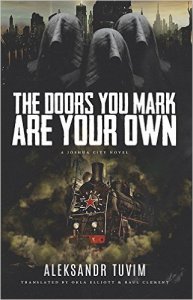
![IMG_2546[1]](https://bullspec.files.wordpress.com/2015/12/img_25461.jpg?w=225&h=300)
